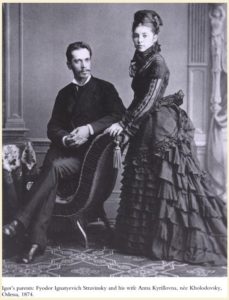On September 21, 1962 – 58 years ago today – the composer Igor Stravinsky returned to Russia for the first time in 48 years: he had been gone since 1914.

Igor Fyodorovich Stravinsky was born on June 17, 1882 in the tony summer resort town of Oranienbaum (today known as Lomonosov) on the Gulf of Finland, about 25 miles from St. Petersburg. His father Fyodor Ignatievich Stravinsky (1843-1902) was a well-known opera singer – a bass (oh, how the Russians love their bass singers!) – with the Kyiv Opera and Mariinsky Theater there in Peter. The Stravinsky family was of Russian-Polish heritage, descended, we are told by biographer Steven Walsh:
“from a long line of Polish grandees, senators and landowners.”
Stravinsky’s mother Anna Kirillovna Stravinskaya (born Kholodovskaya, 1854-1939) was from Kiev, and came from a family hardly less distinguished than her husband’s: landowners from the governing class of 19th century Russia. She numbered among her ancestors distinguished politicians, military officers, noblemen and noblewomen.
Igor Stravinsky grew up in St. Petersburg with his three brothers (two older, one younger), his mother and father, and the servants (as many as five or six), in a large, eight-room, second-story flat at No. 66 Kryukov Canal. Many years later Stravinsky described the family home this way:
“Our flat was furnished in the usual Victorian manner – with the usual bad paintings, the usual mauve upholstery, etc., but with an unusual library and two grand pianos. To recall it gives me no pleasure, however. I do not like to remember my childhood.”
Well, like to remember it or not, Stravinsky grew up a privileged member of the lower nobility in a city – in a country – that would soon enough destroy his class and everything having to do with it.
The immediate catalyst for the Russian Revolution and Stravinsky’s subsequent 48-year exile from his native country was World War One.
At the time the war started in July 1914, Stravinsky was 32 years old and had experienced phenomenal success. His great balletic triumvirate – The Firebird (1910), Petrushka (1911), and The Rite of Spring (1912) – had marked him as the man: the young giant of the avant-garde, the Russian Sultan of Slam, the Ayatollah of Russki rock ‘n’ rolla.
Physically, though, Stravinsky was no giant, and his frail health and miniscule stature kept him out of the Russian army. Instead, he sat out the war in Switzerland hardly 100 miles from the trenches of the western front and watched while his world went up in flames: his brother Gury – two years his junior and his favorite – died serving in the Russian army, and his family’s summer home in Ukraine was nearly destroyed in the fighting. Performances of his music dried up. By war’s end in 1918, Stravinsky – the sole breadwinner for a family of six – was in dire financial straits.
And then things got worse.…
Continue reading, only on Patreon!
Become a Patron!Listen on the Music History Monday Podcast
Podcast: Play in new window
Subscribe: Apple Podcasts | Spotify | Pandora | iHeartRadio | RSS | More
